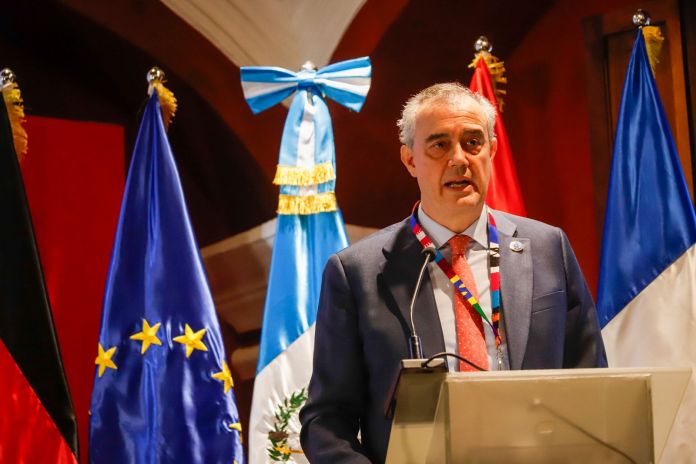- Caribbean countries participate for the first time as full members in the Annual Meeting of Euroclima, the European Union’s flagship programme for cooperation on climate change in Latin America and the Caribbean.
LA ANTIGUA, Guatemala – Fourteen countries from the Caribbean are among the 33 countries that are participating in the Euroclima annual meeting, being held March 5 – 7, 2024 at the Centro de Formación de la Cooperación Española in Antigua, Guatemala. Euroclima is the European Union’s flagship programme to combat climate change and protect biodiversity in the Latin America and Caribbean (LAC) regions. This first annual meeting since the integration of 14 additional Caribbean countries into the programme brings Euroclima stakeholders together to review the achievements of the past year and discuss priority actions for 2024.
The annual meeting of the Euroclima Programme in Guatemala is a key opportunity to review methodologies, share lessons learned and chart new sectoral objectives and timelines for achieving the core purpose of the programme – contributing to a green and just transition for Latin America and the Caribbean; a transition towards circular economies that are carbon-neutral, resilient, risk-assessed, integrated with nature, sustainable, inclusive, and equitable.
“The consequences of climate change, biodiversity loss and pollution are becoming increasingly serious. During the EU-CELAC Summit in July 2023, the European Union and our Latin American and Caribbean partners committed to boost efforts to tackle this global challenge together. That is why we are widening both the geographic and thematic scope of the Euroclima Programme to confront this existential threat to life on our planet,” affirmed European Commissioner for International Partnerships, Jutta Urpilainen.
Euroclima made important progress in 2023 thanks to three key milestones, which included the integration of 14 Caribbean countries into the programme – Antigua and Barbuda, The Bahamas, Barbados, Belize, Dominica, Grenada, Guyana, Haiti, Jamaica, St Kitts and Nevis, Saint Lucia, St Vincent and the Grenadines, Suriname, and Trinidad and Tobago.
This expansion built on the EU-Caribbean partnerships launched by Commissioner Urpilainen in 2022. The second pivotal moment was the relaunching of relations between the European Union and Latin American and the Caribbean during the EU-CELAC Summit in July. Thirdly, 2023 saw the launch of the EU-LAC Global Gateway Investment Agenda, which will allow Euroclima to drive better climate policies, as well as facilitate ambitious green infrastructure projects in the region.
“As long-standing partners in the LAC region, we are excited to witness the expansion of Euroclima to the wider Caribbean and the opportunities to build on the ongoing regional support under a number of initiatives. Euroclima provides the opportunity to streamline our efforts and strengthen the Team Europe approach in a collaborative way. It draws on the unique expertise that EU member states can offer to address the triple planetary crisis. More importantly, the programme offers the opportunity of leveraging private investments to ensure the scalability and sustainability of EU climate action in the framework of the Global Gateway Investment Agenda,” noted the European Union’s Ambassador to Barbados, the Eastern Caribbean States, the OECS and CARICOM/CARIFORUM, Malgorzata Wasilewska.
Commissioner Urpilainen was represented in Guatemala by the director for Latin America and the Caribbean of the European Commission’s Directorate-General of International Partnerships, Félix Fernández-Shaw, who included the annual meeting of the Euroclima Programme as one of the key moments of his visit to Guatemala.
Guatemala’s minister of environment and natural resources, María José Iturbide, asserted:
“This partnership with the European Union is of great benefit to Guatemala, especially with the regional development programme, EUROCLIMA, through which we are implementing a series of projects that will benefit the Guatemalan people.”
“Recently, we presented the strategic pillars and measures that must underpin the development of a National Transition Strategy towards the Circular Economy in Guatemala. Work is also being done to implement the Strategic Plan for the Manabique Point and Cuyamel-Omoa Sustainable Biological Corridor – Wildlife Refuge, a two-country project that also includes Honduras. And we continue to explore new collaborations with the Euroclima Programme with the aim that each one meets its purpose of environmental sustainability and climate adaptation and mitigation.”
Since its creation in 2010, the Euroclima Programme has launched more than 260 initiatives with partner countries. Some initiatives have driven large-scale national projects (such as the development of long-term climate strategies, climate change legislation, gender and climate change action plans, among many others), others were designed as localized pilot projects with the potential to be replicated in other territories (such as the electrification of the ‘tuk-tuk’ fleet in Chimaltenango or the management of urban water in the Marqués Valley in Guatemala; the urban bicycles network in Guadalajara, Mexico; or the development of Regional Climate Change Action Plans in Chile).
Since 2010, the European Union has approved an amount of €265 million for Euroclima. Some actions have been completed, others are currently being implemented, and some €50 million remain to be allocated/implemented. An additional amount of €50 million is in the process of being approved, which would bring the total available amount for cooperation with the region to roughly €100 million.





